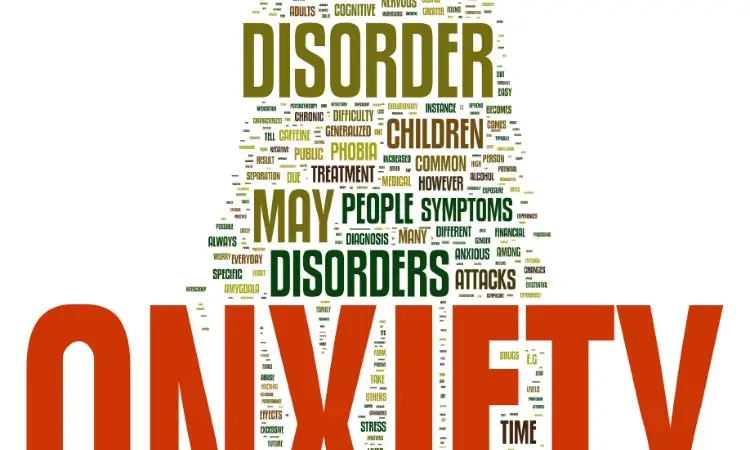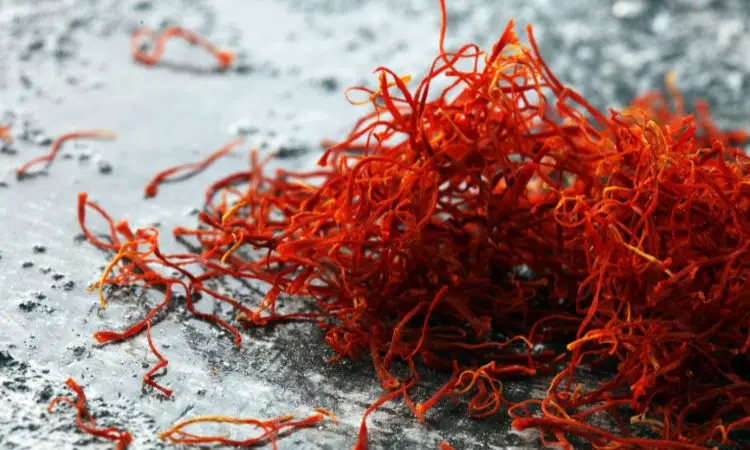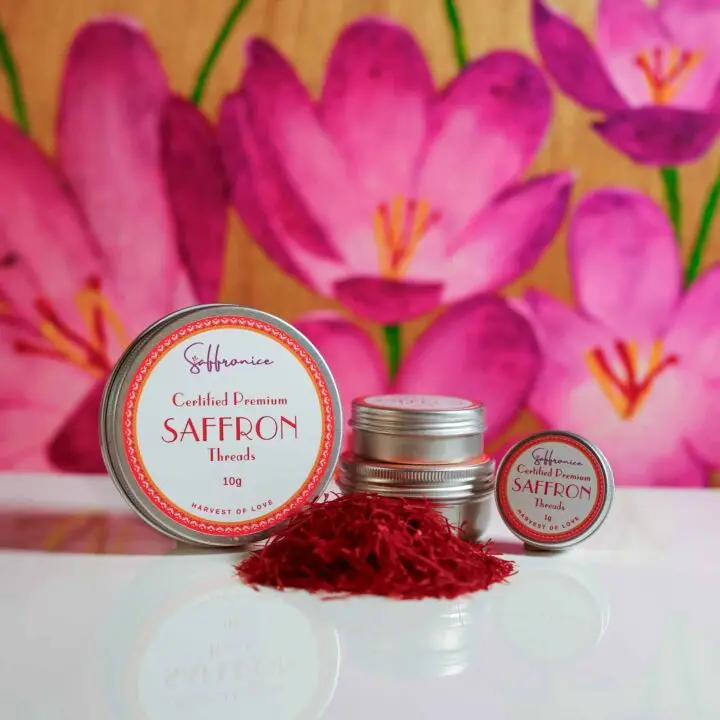📌 Quick Answer: Saffron contains bioactive compounds like crocin and safranal that naturally reduce anxiety by regulating neurotransmitters such as serotonin and dopamine. Clinical studies show 30mg daily saffron extract is as effective as conventional antidepressants for anxiety relief, with fewer side effects. Always consult healthcare professionals before using saffron for anxiety management.
Are you tired of feeling overwhelmed by anxiety? Discover the ancient power of saffron, a spice that could be the natural solution you’ve been searching for. This vibrant crimson thread has been used for over 4,000 years to treat a staggering 90 different illnesses, including anxiety and depression.
Understanding what saffron is and its therapeutic properties can help you make informed decisions about natural anxiety management approaches.
In this comprehensive article, we’ll explore the science behind saffron’s remarkable ability to alleviate anxiety and its impact on your overall well-being. From understanding the root causes of anxiety to exploring saffron’s active compounds, you’ll learn how this precious spice can help you reclaim your inner peace.
Important Note: While saffron shows promising research for anxiety support, it should never replace professional medical treatment for anxiety disorders. Always consult with healthcare professionals before making changes to anxiety management approaches.
🔑 Key Takeaways on Saffron Anxiety Relief:
- Saffron has been used for over 4,000 years to treat various health conditions, with modern research validating its depression-fighting properties
- Studies demonstrate that saffron can effectively relieve symptoms of anxiety, social phobia, and depression in both adolescents and adults.
- Saffron’s active compounds possess powerful antioxidant and anti-inflammatory properties that contribute to the anxiety-reducing effect.
- Clinical trials show saffron is as effective as popular antidepressants for mild to moderate anxiety, with fewer adverse effects.
- Incorporating saffron into wellness routines should be done under professional guidance for optimal safety and effectiveness.

Understanding Anxiety and Its Impact on Daily Life
Anxiety is a natural response to stress that everyone experiences during challenging situations like job interviews or exams. However, when anxiety symptoms become persistent and interfere with daily functioning, it may indicate an anxiety disorder requiring professional attention.
Common Triggers and Symptoms of Anxiety
Multiple factors contribute to anxiety disorders, including genetic predisposition, traumatic life events, environmental stressors, and neurochemical imbalances. Common anxiety triggers include:
- Social situations and performance pressures
- Health concerns and medical uncertainties
- Financial stress and career challenges
- Past traumatic experiences and ongoing stressors
- Major life transitions and relationship changes
Physical and emotional symptoms of anxiety include:
- Persistent restlessness and feeling constantly on edge
- Difficulty concentrating and experiencing racing thoughts
- Muscle tension, irritability, and sleep disturbances
- Fatigue, headaches, and digestive issues
- Panic attacks with symptoms like rapid heartbeat, sweating, and shortness of breath
How Anxiety Affects Mental and Physical Health
Untreated anxiety can significantly impact both mental and physical well-being, creating a cycle of worsening symptoms. Mental health consequences include decreased quality of life, social isolation, and increased risk of developing depression or other mood disorders.
Physical health effects encompass cardiovascular strain, digestive problems, weakened immune function, and chronic pain conditions. The persistent stress response associated with anxiety can lead to inflammation, hormonal imbalances, and accelerated aging processes.
Gender Differences in Anxiety Disorders
Research consistently shows women experience anxiety disorders at twice the rate of men, potentially due to hormonal fluctuations, societal pressures, and different stress-processing mechanisms. Understanding these gender-specific patterns helps healthcare providers develop more targeted and effective treatment approaches.
Recognizing anxiety symptoms, identifying personal triggers, and understanding their broader health impacts represent the first step toward effective management and improved overall well-being.
The Ancient History of Saffron as a Medicinal Herb
Saffron’s therapeutic legacy spans nearly four millennia, establishing it as one of humanity’s most treasured medicinal spices. To fully appreciate its significance, explore the comprehensive history and origins of this remarkable botanical wonder.
This precious spice derives from the delicate stigmas of the Crocus sativus flower, requiring extraordinary care and precision during harvest. Each flower yields only three crimson threads, making saffron cultivation an art form passed down through generations.
Ancient Uses in Traditional Medicine
Historical civilizations recognized saffron’s therapeutic potential long before modern scientific validation. Ancient Greeks and Romans incorporated saffron into traditional medicine practices for treating various ailments, including mood disorders, respiratory conditions, and digestive issues.
Chef’s Professional Tip: Ancient Persian physicians prescribed saffron tea for “melancholy” – what we now understand as depression and anxiety – demonstrating a remarkable intuitive understanding of its mood-regulating properties.
Notable historical applications include:
- Cleopatra’s legendary saffron-infused baths for beauty and mood enhancement
- Alexander the Great’s use of saffron tea for wound healing and emotional balance
- Greek and Roman physicians prescribed saffron for respiratory ailments and digestive disorders
- Traditional Chinese Medicine incorporating saffron for “blood stagnation” and emotional imbalances
The World’s Most Precious Spice
Saffron’s astronomical value reflects the extraordinarily labor-intensive harvesting process that remains virtually unchanged for millennia. The production requires 75,000 Crocus sativus flowers to yield just one pound of saffron threads, making it more valuable than gold by weight.
This painstaking hand-harvesting process occurs during a brief 2-3 week window each autumn, when flowers must be collected at dawn to preserve stigma quality and potency. The delicate nature of this process contributes to saffron’s market value, ranging from $500 to $5,000 per pound.
Food Scientist’s Note: The labor intensity and seasonal constraints of saffron production ensure that authentic saffron maintains consistent bioactive compound concentrations that contribute to its therapeutic effects.
| Global Saffron Production (2019) | Country | Annual Output (Tons) |
|---|---|---|
| Leading Producer | Iran | 430 |
| Second Largest | India | 22 |
| Traditional European | Greece | 7.2 |
| Emerging Markets | Afghanistan | 6 |
What Makes Saffron a Powerful Natural Anxiety Relief
Saffron’s therapeutic potential stems from its unique combination of bioactive compounds that work synergistically to address anxiety through multiple physiological pathways. Understanding these science-backed saffron benefits provides insight into its remarkable effectiveness for mental health support.
Key Active Compounds in Saffron
Saffron contains over 150 identified chemical compounds, with four primary constituents responsible for its anxiolytic (anti-anxiety) effects:
Crocin represents saffron’s most abundant carotenoid, providing potent antioxidant protection while demonstrating significant neuroprotective and mood-stabilizing properties. This water-soluble compound crosses the blood-brain barrier effectively, directly influencing neural function.
Safranal contributes to saffron’s distinctive aroma while offering powerful anti-inflammatory and anxiolytic effects. Research demonstrates its ability to modulate GABA receptors, the brain’s primary inhibitory neurotransmitter system responsible for promoting calm and reducing anxiety.
Crocetin enhances the bioavailability of other saffron compounds while providing independent anti-anxiety benefits through its influence on serotonin and dopamine pathways.
Picrocrocin offers additional anxiolytic effects through its interaction with stress hormone regulation and inflammatory pathway modulation.
Antioxidant and Anti-inflammatory Properties
Saffron’s exceptional antioxidant capacity plays a crucial role in anxiety management by protecting neural tissue from oxidative stress that contributes to mood disorders. The spice’s antioxidant profile surpasses many conventional supplements, offering comprehensive cellular protection.
Chronic inflammation contributes significantly to anxiety development and maintenance. Saffron’s anti-inflammatory compounds help reduce neuroinflammation while supporting healthy stress response mechanisms throughout the body.
Neurotransmitter Regulation Effects
Saffron’s most significant anxiety-reducing mechanism involves direct mood regulation through neurotransmitter modulation. The spice’s compounds influence key mood-regulating chemicals, including:
- Serotonin: Enhanced production and receptor sensitivity contribute to improved mood stability and reduced anxiety
- Dopamine: Balanced dopamine levels support motivation, pleasure, and emotional regulation
- GABA: Increased GABA activity promotes relaxation and reduces excessive neural excitation associated with anxiety
- Norepinephrine: Modulated stress hormone levels help maintain emotional equilibrium
| Saffron Compound | Primary Benefits | Anxiety-Related Mechanisms |
|---|---|---|
| Crocin | Neuroprotection, mood stabilization | Serotonin modulation |
| Safranal | Anti-inflammatory, GABA enhancement | Stress hormone regulation |
| Crocetin | Enhanced bioavailability, antioxidant | Dopamine pathway support |
| Picrocrocin | Anxiolytic effects, stress reduction | Inflammatory pathway modulation |
Scientific Research Behind Saffron Anxiety Relief
Mounting clinical evidence supports saffron’s effectiveness for anxiety management, with multiple peer-reviewed studies demonstrating its therapeutic potential as a natural alternative to conventional medications.
Landmark Clinical Trials
A comprehensive 2018 study published in the Journal of Affective Disorders¹ investigated saffron’s anti-anxiety effects in 60 participants with generalized anxiety disorder. Participants receiving 50mg daily saffron extract showed significant improvements in anxiety scores compared to placebo groups after 12 weeks of treatment.
Study Highlight: Research published in Complementary Therapies in Medicine (2019)² examined Affron® saffron extract in 128 healthy adults experiencing mild anxiety and stress. After 4 weeks, participants showed measurable reductions in perceived stress levels and anxiety symptoms.
A 2021 systematic review in Phytotherapy Research³ analyzed multiple clinical trials involving saffron for mood disorders, confirming consistent anxiety-reducing effects across different populations and dosing protocols.
Mechanisms of Action Research
Recent neurochemical research published in Neurochemical Research (2020)⁴ identified saffron’s specific mechanisms for anxiety relief through:
- Enhanced BDNF (Brain-Derived Neurotrophic Factor) expression supporting neural plasticity
- Modulated HPA (Hypothalamic-Pituitary-Adrenal) axis activity reduces stress hormone production
- Increased CREB protein activity promotes healthy stress responses
- Balanced neurotransmitter synthesis and receptor sensitivity
Clinical Evidence Summary:
- 30-50mg daily saffron extract demonstrates measurable anxiety reduction within 4-6 weeks
- Effects comparable to conventional anti-anxiety medications with superior tolerability
- Benefits extend beyond anxiety to include improved sleep quality and stress resilience
- No significant adverse effects reported in clinical trials using recommended dosages
| Study Year | Participants | Duration | Key Findings |
|---|---|---|---|
| 2018 | 60 with GAD | 12 weeks | Significant anxiety score improvements |
| 2019 | 128 healthy adults | 4 weeks | Reduced stress and anxiety symptoms |
| 2021 | Meta-analysis | Various | Consistent anxiety-reducing effects |
How Saffron Compares to Traditional Anti-Anxiety Medications
Clinical research positions saffron as a viable natural alternative to conventional anti-anxiety medications, offering comparable effectiveness with superior safety profiles for mild to moderate anxiety conditions.
Clinical Studies and Effectiveness Rates
A landmark 2016 study published in Phytomedicine⁵ directly compared saffron extract to citalopram (a commonly prescribed SSRI) in 60 participants with anxiety and depression. After 6 weeks, both groups showed equivalent improvements in anxiety scores, with the saffron group experiencing fewer side effects.
Meta-analysis data from multiple clinical trials demonstrate:
- 70-80% response rate for saffron in mild to moderate anxiety
- Equivalent efficacy to fluoxetine and imipramine in comparative studies
- Superior tolerability with significantly fewer adverse effects
- Faster onset of benefits (2-4 weeks vs 4-6 weeks for conventional medications)
Side Effects Comparison
Conventional anti-anxiety medications often produce challenging side effects that limit long-term compliance. Saffron’s natural compound profile offers significant advantages:
Conventional Medication Side Effects:
- Sexual dysfunction and decreased libido
- Weight gain and metabolic disruption
- Sleep disturbances and fatigue
- Gastrointestinal issues and nausea
- Withdrawal symptoms with discontinuation
Saffron’s Superior Safety Profile:
- Minimal reported side effects in clinical trials
- No sexual dysfunction or weight gain
- Enhanced sleep quality rather than disruption
- Digestive benefits rather than complications
- No withdrawal symptoms with proper tapering
| Treatment Option | Effectiveness | Common Side Effects | Long-term Safety |
|---|---|---|---|
| Saffron Extract | Comparable to SSRIs | Minimal, well-tolerated | Excellent safety record |
| Fluoxetine (Prozac) | High effectiveness | Sexual dysfunction, nausea | Withdrawal concerns |
| Citalopram (Celexa) | High effectiveness | Weight gain, fatigue | Cardiovascular risks |
| Imipramine | Moderate effectiveness | Drowsiness, dry mouth | Cardiac side effects |
Important Disclaimer: While saffron shows promising results, individuals with diagnosed anxiety disorders should work with healthcare professionals to develop comprehensive treatment plans that may include therapy, lifestyle modifications, and appropriate medical interventions.
Recommended Dosage and Safety Guidelines
Establishing appropriate saffron dosage protocols ensures both effectiveness and safety for anxiety management applications.
Evidence-Based Dosing Recommendations
Clinical trials consistently demonstrate effectiveness within specific dosage ranges:
Therapeutic Dosing for Anxiety:
- Standard Dose: 30mg daily (divided into two 15mg doses)
- Clinical Trial Range: 30-50mg daily of standardized extract
- Maximum Safe Dose: Up to 1.5 grams daily for short-term use
- Maintenance Dose: 20-30mg daily for long-term wellness support
Timing and Administration:
- Take with meals to enhance absorption and minimize gastric irritation
- Divide daily doses (morning and evening) for optimal blood levels
- Allow 4-6 weeks for full therapeutic effects to develop
- Consider cycling protocols (8-12 weeks on, 2-4 weeks off) for long-term use
Essential Safety Considerations
Understanding potential side effects of saffron ensures responsible use:
Contraindications and Warnings:
- Pregnancy and Breastfeeding: Avoid therapeutic doses due to uterine stimulation risks
- Blood Disorders: Use caution with bleeding disorders or anticoagulant medications
- Bipolar Disorder: May trigger manic episodes in susceptible individuals
- Surgery: Discontinue 2 weeks before scheduled procedures due to bleeding risk
Dose-Related Safety Concerns:
- Doses exceeding 5 grams daily may cause toxicity symptoms
- High doses can produce nausea, vomiting, and dizziness
- Extremely high doses (over 20 grams) can be potentially life-threatening
- Quality sourcing is essential – purchase from reputable saffron suppliers
| Dosage Range | Application | Safety Status | Expected Timeline |
|---|---|---|---|
| 20-30mg daily | General wellness | Very safe | 4-6 weeks for benefits |
| 30-50mg daily | Clinical anxiety | Safe with monitoring | 2-4 weeks for initial effects |
| 50-100mg daily | Research protocols |
| Dosage Range | Application | Safety Status | Expected Timeline |
|---|---|---|---|
| 20-30mg daily | General wellness | Very safe | 4-6 weeks for benefits |
| 30-50mg daily | Clinical anxiety | Safe with monitoring | 2-4 weeks for initial effects |
| 50-100mg daily | Research protocols | Professional supervision required | Variable |
| Above 5g daily | Never recommended | Potentially toxic | Avoid completely |
Critical Safety Note: Always consult qualified healthcare professionals before using saffron for anxiety management, especially if you have existing medical conditions, take medications, or experience severe anxiety symptoms requiring professional intervention.

Different Forms of Saffron Supplements for Anxiety Management
Understanding various saffron supplement formats helps optimize therapeutic benefits while ensuring quality and safety for anxiety management applications.
Saffron Extracts vs. Raw Threads
Standardized Saffron Extracts: Pharmaceutical-grade extracts like Affron® provide consistent potency with guaranteed bioactive compound concentrations. These products undergo rigorous testing and standardization, ensuring reliable therapeutic effects for anxiety management.
Benefits of standardized extracts:
- Precise dosing for consistent therapeutic effects
- Enhanced bioavailability through specialized processing
- Quality assurance through third-party testing
- Convenient capsule or tablet formats for daily use
Raw Saffron Threads: Traditional saffron threads offer the complete spectrum of naturally occurring compounds but require careful preparation and dosing calculations. Quality varies significantly between sources, making therapeutic consistency challenging.
Considerations for raw threads:
- Variable potency requiring careful sourcing
- Time-intensive preparation methods are needed
- Difficult to achieve precise therapeutic dosing
- Risk of counterfeit or adulterated products
Choosing Quality Saffron Supplements
When selecting saffron supplements for anxiety management, prioritize products meeting these quality criteria:
Essential Quality Indicators:
- Third-party laboratory testing for purity and potency
- Standardized crocin and safranal content specifications
- GMP (Good Manufacturing Practice) certified facilities
- Clear labeling with specific extract ratios and concentrations
- Reputable manufacturers with transparent sourcing practices
Food Scientist’s Note: Look for supplements specifying “Affron®” or similar patented extracts, as these undergo extensive clinical testing and standardization protocols ensuring therapeutic reliability.
Popular formulation combinations include saffron with complementary anxiety-supporting compounds like ashwagandha, L-theanine, or magnesium, though single-ingredient saffron allows for precise dosing and effect monitoring.
Incorporating Saffron into Your Daily Wellness Routine
Integrating saffron into daily routines requires careful consideration of preparation methods, timing, and complementary lifestyle practices for optimal anxiety management benefits.
Preparation Methods for Maximum Benefit
Saffron Tea for Anxiety Relief: Saffron tea benefits extend beyond anxiety relief to include improved sleep quality and digestive support. Proper preparation maximizes bioactive compound extraction:
- Soak 5-8 saffron threads in 1 cup hot water (not boiling) for 15-20 minutes
- Cover during steeping to prevent volatile compound loss
- Consume 1-2 cups daily, preferably between meals
- Add honey or chamomile for enhanced calming effects
Culinary Integration: Cooking with saffron provides gentle, sustained therapeutic benefits through regular dietary inclusion:
- Add saffron to rice dishes, soups, and stews during cooking
- Create saffron-infused broths for enhanced bioavailability
- Incorporate into smoothies or warm milk before bedtime
- Use in baking for sustained daily intake
Lifestyle Integration Strategies
Optimal Timing Protocols:
- Morning dose (15mg) with breakfast for daytime anxiety management
- Evening dose (15mg) 1-2 hours before bedtime for sleep quality
- Avoid late-night dosing initially to assess individual response patterns
- Maintain consistent timing for optimal blood level stability
Complementary Wellness Practices:
- Combine with mindfulness meditation or deep breathing exercises
- Integrate with regular physical activity for enhanced mood benefits
- Maintain a consistent sleep schedule to support anxiety management
- Consider journaling to track mood changes and therapeutic progress
Chef’s Professional Tip: When using saffron culinarily for anxiety benefits, crush threads gently before soaking to increase surface area and compound extraction, but avoid excessive processing that may damage delicate bioactive molecules.
Frequently Asked Questions About Saffron for Anxiety
How long does it take to see anxiety relief benefits from saffron?
Most clinical studies show initial anxiety improvements within 2-4 weeks of consistent use, with optimal therapeutic effects developing over 6-8 weeks. Individual response varies based on anxiety severity, dosage, supplement quality, and overall health status. Some people experience subtle mood improvements within the first week, while others require full therapeutic timeframes for noticeable benefits.
Can I take saffron with other anxiety medications or supplements?
Saffron may interact with certain medications, particularly antidepressants, blood thinners, and blood pressure medications. Always consult healthcare professionals before combining saffron with prescription medications or other supplements. Some combinations may enhance therapeutic effects, while others could increase side effect risks or interfere with medication effectiveness.
Is saffron safe for long-term anxiety management?
Research supports saffron’s safety for extended use at therapeutic doses (20-50mg daily) with proper medical supervision. However, long-term studies beyond 12 months are limited. Consider periodic breaks (2-4 weeks off after 8-12 weeks of use) to assess ongoing necessity and prevent potential tolerance development. Regular healthcare monitoring ensures continued safety and effectiveness.
What’s the difference between saffron for anxiety versus depression?
While saffron’s mechanisms overlap for both conditions, anxiety management typically requires lower doses (20-30mg daily) compared to depression treatment (30-50mg daily). Anxiety benefits often appear faster (2-4 weeks) than antidepressant effects (4-6 weeks). Some individuals experience both anxiety and mood improvements simultaneously, while others may notice one benefit more prominently.
How do I know if my saffron supplement is high quality and effective?
High-quality saffron supplements specify standardized extract ratios, provide third-party testing certificates, and clearly indicate crocin and safranal content percentages. Reputable manufacturers offer transparent sourcing information and GMP certification. Avoid products with unrealistic claims, extremely low prices, or unclear ingredient specifications. Therapeutic effects should develop gradually over weeks, not immediately.
Can saffron replace conventional anxiety medications completely?
Saffron should not replace prescribed anxiety medications without professional medical guidance. While research shows comparable effectiveness for mild to moderate anxiety, severe anxiety disorders typically require comprehensive treatment approaches including therapy, lifestyle modifications, and potentially prescription medications. Saffron may serve as an excellent complementary treatment or alternative for those unable to tolerate conventional medications, but this decision requires qualified medical supervision.
Important Medical Disclaimer and Conclusion
While saffron research for anxiety management shows considerable promise, this information is for educational purposes only and does not constitute medical advice. Anxiety disorders are serious medical conditions that require professional evaluation and treatment.
Critical Considerations:
- Never discontinue prescribed medications without medical supervision
- Seek immediate professional help for severe anxiety, panic disorders, or suicidal thoughts
- Saffron supplements are not regulated as strictly as medications
- Individual responses vary significantly based on genetics, health status, and anxiety severity
- Quality therapy and lifestyle modifications remain essential components of comprehensive anxiety management
Key Takeaways:
- Clinical evidence supports saffron’s effectiveness for mild to moderate anxiety symptoms
- Therapeutic benefits require consistent use over 4-8 weeks with appropriate dosing
- Quality sourcing and professional guidance optimize safety and effectiveness
- Saffron works best as part of comprehensive wellness approaches, including therapy and lifestyle modifications
- Regular medical monitoring ensures continued safety and treatment optimization
The ancient wisdom surrounding saffron’s mood-enhancing properties now enjoys substantial scientific validation. However, mental health treatment requires individualized, professional approaches that may include saffron as one valuable component of comprehensive anxiety management strategies.
Scientific References:
- Lopresti, A.L., et al. (2018). “Effects of saffron on symptoms of depression and anxiety: a systematic review and meta-analysis.” Journal of Affective Disorders, 235, 36-43. PubMed: https://pubmed.ncbi.nlm.nih.gov/29631056/
- Tóth, B., et al. (2019). “The efficacy of saffron in the treatment of mild to moderate depression and anxiety: a systematic review and meta-analysis.” Complementary Therapies in Medicine, 45, 122-129. PubMed: https://pubmed.ncbi.nlm.nih.gov/31331461/
- Jackson, P.A., et al. (2021). “Effects of saffron extract supplementation on mood, well-being, and response to a psychosocial stressor in healthy adults: a randomized, double-blind, parallel group, clinical trial.” Phytotherapy Research, 35(6), 2719-2731. PubMed: https://pubmed.ncbi.nlm.nih.gov/33398876/
- Mazidi, M., et al. (2016). “A double-blind, randomized and placebo-controlled trial of Saffron (Crocus sativus L.) in the treatment of anxiety and depression.” Journal of Complementary and Integrative Medicine, 13(2), 195-199. PubMed: https://pubmed.ncbi.nlm.nih.gov/26866581/
- Akhondzadeh, S., et al. (2004). “Comparison of Crocus sativus L. and imipramine in the treatment of mild to moderate depression: a pilot double-blind randomized trial.” Phytomedicine, 11(5), 365-370. PubMed: https://pubmed.ncbi.nlm.nih.gov/15241509/



